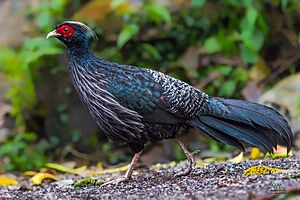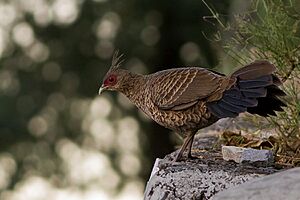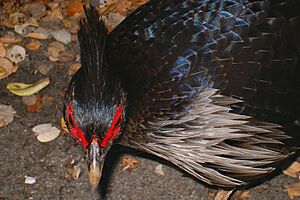Kalij pheasant facts for kids
Quick facts for kids Kalij pheasant |
|
|---|---|
 |
|
| Male L. leucomelanos hamiltoni, Uttarakhand, India | |
 |
|
| Female L. leucomelanos hamiltoni, Uttarakhand, India | |
| Conservation status | |
| Scientific classification |
|
| Kingdom: | Animalia |
| Phylum: | Chordata |
| Class: | Aves |
| Order: | Galliformes |
| Family: | Phasianidae |
| Genus: | Lophura |
| Species: |
L. leucomelanos
|
| Binomial name | |
| Lophura leucomelanos (Latham, 1790)
|
|
| Script error: The function "autoWithCaption" does not exist. | |
Script error: No such module "Check for conflicting parameters".
The kalij pheasant (Lophura leucomelanos) is a beautiful bird found in forests and thick areas. You can mostly spot them in the Himalayan foothills. Their home stretches from Nepal and Pakistan all the way to western Thailand.
Male kalij pheasants look quite different depending on where they live. But they all have shiny bluish-black feathers. Female kalij pheasants are usually brownish. Both males and females have bright red skin on their faces and greyish legs. Their grey legs help tell them apart from the silver pheasant, which has red legs.
This bird is generally common and found in many places. However, some types (called subspecies) in the eastern parts of their range are considered threatened. One subspecies, L. l. moffitti, is hardly ever seen in the wild. On October 21, 2021, the Government of Jammu and Kashmir chose the Kalij Pheasant as the official bird for their Union Territory.
You might see the name spelled kaleege in older books. The kalij pheasant was brought to Hawaii in 1962. There, it became a popular bird for hunting.
Contents
About the Kalij Pheasant Family
The kalij pheasant is very closely related to the silver pheasant. Sometimes, these two types of pheasants even have babies together, which are called hybrids.
Scientists often discuss how to group different types of pheasants. For example, some types like L. l. lineata and L. l. crawfurdi have grey legs, like the kalij pheasant. But their feathers look more like some silver pheasants. Also, they live east of the Irrawaddy River, which is a natural border for many animals. Most other kalij pheasants live west of this river.
Thanks to modern science, like studying mtDNA (a type of DNA), scientists have confirmed that L. l. lineata and L. l. crawfurdi are indeed types of kalij pheasants.
Different Types of Kalij Pheasants
There are nine known types, or subspecies, of the kalij pheasant. Each one has slightly different features or lives in a different area. Here are the recognized subspecies:
- L. l. hamiltoni – white-crested kalij pheasant – found in the western Himalayas
- L. l. leucomelanos – the main type – found in the forests of Nepal
- L. l. melanota – black-backed kalij pheasant – found in Sikkim and western Bhutan
- L. l. moffitti – black kalij pheasant – found in central Myanmar
- L. l. lathami – Horsfield's pheasant – found from eastern Bhutan and northern India to Myanmar
- L. l. williamsi – Williams' kalij pheasant – found in western Myanmar
- L. l. oatesi – Oates' kalij pheasant – found in southern Myanmar
- L. l. crawfurdi – Crawfurd's pheasant – found from southeastern Myanmar to peninsular Thailand
- L. l. lineata – lineated pheasant – found from southern Myanmar to northwestern Thailand
What Kalij Pheasants Look Like

Male kalij pheasants are about 63 to 74 centimeters (25 to 29 inches) long. Females are a bit smaller, around 50 to 60 centimeters (20 to 24 inches) long.
The different types of kalij pheasants can be grouped into two main categories. The first group lives in the western and central parts of their home range. This includes types like L. l. hamiltoni, L. l. leucomelanos, L. l. melanota, L. l. moffitti, and L. l. lathami. In these males, most of their feathers are shiny blue-black. Some even have white on their back or belly. The L. l. hamiltoni type, which lives furthest west, has a white crest on its head. All other types have a blue-black crest.
The second group of kalij pheasants lives in the eastern part of their range. This group includes L. l. williamsi, L. l. oatesi, L. l. lineata, and L. l. crawfurdi. In these males, their belly and crest are shiny blue-black. But their tail and upper body are white or very light grey. These feathers also have many small black lines.
Female kalij pheasants are mostly brownish. In some types, their bellies have clear white and black marks. In others, the edges of their feathers are light, making them look a bit scaly.
Official Bird of Jammu and Kashmir
On October 21, 2021, the Government of Jammu and Kashmir made the Kalij Pheasant the official bird of the Union Territory of Jammu and Kashmir.
In the Kashmiri language, the Kalij Pheasant is known by names like Wan Kokur, Wan Kokud, or Ban Kokur. These names all mean "wild cock."
See also
 In Spanish: Faisán Kalij para niños
In Spanish: Faisán Kalij para niños
 | Percy Lavon Julian |
 | Katherine Johnson |
 | George Washington Carver |
 | Annie Easley |


